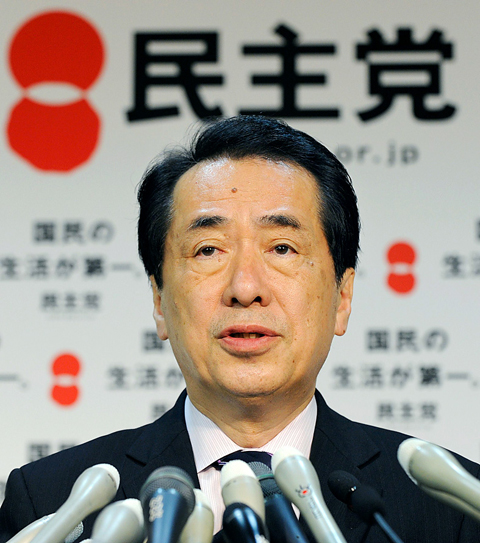Former Japanese finance minister Naoto Kan became Japan’s new leader yesterday, pledging economic recovery and close ties with Washington after his predecessor quit over a festering dispute about a US air base.
A parliamentary vote confirmed Kan as the successor to Yukio Hatoyama, who tearfully resigned as Japanese prime minister on Wednesday, citing the row over the base on Japan’s Okinawa island and money scandals that sullied his government.
Kan, a former leftist activist, is Japan’s fifth prime minister in four years, and the first in more than a decade who does not hail from a political dynasty.

PHOTO: AFP
The 63-year-old previously served as finance minister and deputy prime minister in Hatoyama’s center-left government, which came to power last year in a landslide election, ending half a century of almost non-stop conservative rule.
“My first job is to rebuild the country, and to create a party in which all members can stand up together and say with confidence: ‘We can do it,’” a smiling Kan said after his party earlier installed him as its new leader.
Kan vowed to revitalize Asia’s biggest economy, which has been in the doldrums since an investment bubble collapsed in the early 1990s.
“For the past 20 years, the Japanese economy has been at a standstill,” Kan said. “Growth has stopped. Young people can’t find jobs. This is not a natural phenomenon. It resulted from policy mistakes.”
“I believe we can achieve a strong economy, strong finances and strong social welfare all at the same time,” he said, pledging to reduce Japan’s huge public debt, which is nearing 200 percent of GDP.
On foreign policy, Kan pointed at the threat posed by North Korea, the isolated and nuclear-armed regime that has been blamed for the deadly sinking of a South Korean warship in March.
“Japan has a lot of problems, including the North Korean issue,” said Kan, adding that US-Japanese ties remain the “cornerstone” of foreign policy after Hatoyama badly strained relations with Washington over the base issue.
He also said he would maintain Japan’s goal to cut greenhouse gas emissions by 25 percent from 1990 levels by 2020, one of the most ambitious targets of any country, and to seek an EU-style Asian community in the future.
It was not clear whether Kan would stick with the expected July 11 date of upper house elections or delay the vote, in which his coalition will fight to keep its wafer-thin majority.

Authorities have detained three former Taiwan Semiconductor Manufacturing Co (TMSC, 台積電) employees on suspicion of compromising classified technology used in making 2-nanometer chips, the Taiwan High Prosecutors’ Office said yesterday. Prosecutors are holding a former TSMC engineer surnamed Chen (陳) and two recently sacked TSMC engineers, including one person surnamed Wu (吳) in detention with restricted communication, following an investigation launched on July 25, a statement said. The announcement came a day after Nikkei Asia reported on the technology theft in an exclusive story, saying TSMC had fired two workers for contravening data rules on advanced chipmaking technology. Two-nanometer wafers are the most

DEFENSE: The first set of three NASAMS that were previously purchased is expected to be delivered by the end of this year and deployed near the capital, sources said Taiwan plans to procure 28 more sets of M-142 High Mobility Artillery Rocket Systems (HIMARS), as well as nine additional sets of National Advanced Surface-to-Air Missile Systems (NASAMS), military sources said yesterday. Taiwan had previously purchased 29 HIMARS launchers from the US and received the first 11 last year. Once the planned purchases are completed and delivered, Taiwan would have 57 sets of HIMARS. The army has also increased the number of MGM-140 Army Tactical Missile Systems (ATACMS) purchased from 64 to 84, the sources added. Each HIMARS launch pod can carry six Guided Multiple Launch Rocket Systems, capable of

CHINA’s BULLYING: The former British prime minister said that he believes ‘Taiwan can and will’ protect its freedom and democracy, as its people are lovers of liberty Former British prime minister Boris Johnson yesterday said Western nations should have the courage to stand with and deepen their economic partnerships with Taiwan in the face of China’s intensified pressure. He made the remarks at the ninth Ketagalan Forum: 2025 Indo-Pacific Security Dialogue hosted by the Ministry of Foreign Affairs and the Prospect Foundation in Taipei. Johnson, who is visiting Taiwan for the first time, said he had seen Taiwan’s coastline on a screen on his indoor bicycle, but wanted to learn more about the nation, including its artificial intelligence (AI) development, the key technology of the 21st century. Calling himself an

South Korea yesterday said that it was removing loudspeakers used to blare K-pop and news reports to North Korea, as the new administration in Seoul tries to ease tensions with its bellicose neighbor. The nations, still technically at war, had already halted propaganda broadcasts along the demilitarized zone, Seoul’s military said in June after the election of South Korean President Lee Jae-myung. It said in June that Pyongyang stopped transmitting bizarre, unsettling noises along the border that had become a major nuisance for South Korean residents, a day after South Korea’s loudspeakers fell silent. “Starting today, the military has begun removing the loudspeakers,”